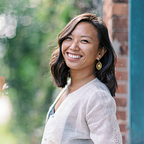Living Hyphen on Dual Citizen — And A Call for Solidarity with Indigenous Nations
Yesterday our work at Living Hyphen was featured on the latest episode of Dual Citizen — a mini documentary series exploring eureka moments within the Filipino diaspora. Through conversations with community leaders, artists, entrepreneurs, educators, and culture changers, Dual Citizen examines the power that comes from embracing dual identities — and how this translates to our respective creative and community work.
I sat down with filmmaker Marie Alcober last year to share my own personal journey. I talk about the push and pull I’ve experienced living in between cultures as a Filipina-Canadian, the lack of diversity in Canada’s arts and literature scene, and the process of building a literary home that nurtures and amplifies the voices of BIPOC (Black, Indigenous and people of colour) writers and artists through.
This interview took place before the launch of Living Hyphen’s inaugural issue and it is such a special experience to watch our journey so many moons later.
To be perfectly honest, it’s also a bit of a strange experience. A part of me feels a little embarassed because I see myself stumbling on my words, not explaining myself as well as I could now. But then another part of me also holds that stumbling as precious. Because it is a testament to how much I’ve grown in the last year, how much clearer my voice has become, how much more forceful I am in my convictions. I’m grateful to the Dual Citizen team for giving me and Living Hyphen this time capsule to remember the beginning stages of our journey.
There is one part to this episode that I want to address directly because it has not been sitting right with me. When Dual Citizen asks me about the most surprising story that’s in our magazine, I talked about one of the submissions from a man of Plains Cree and Métis descent who described his experience of living in between cultures despite being Indigenous to this land. I said, “For him, being an Indigenous person here in Canada has almost felt like a diasporic experience because of the displacement that [the Indigenous community] has felt.”
I cringe when I hear myself say that. I cringe at this segment of the episode because I feel that my words downplay the experiences of Indigenous nations against violent colonial forces. So let me be clear now. It is not merely a displacement that “they felt”. It is not simply a felt experience, but an intentional, systematic, and violent destruction and theft of their peoples, cultures, and land.
For many it might be a small, unnoticeable line but as a writer, educator, and community organizer, I always underscore the importance of the words we use to influence minds, to impact change. In a world that invalidates feelings and disregards the systemic forces at play that lead to such feelings in the first place, our words need to be precise. Words shape the way we see the world and how we decide to move forwards.
I was too early in my journey at this time of filming to speak to this issue. I may not even be well versed enough to speak to it now as I write this over a year later.
As I mention in the episode, the Indigenous experience is one that I never grew up knowing because our system was built to separate us and hide this history. In all honesty, it has only been since launching Living Hyphen that I’ve taken a deep dive into learning and understanding our colonial history here in Canada. It’s only been since launching Living Hyphen that I’ve really recognized and reckoned with my own role and responsibility as an immigrant settler on stolen land.
I am endlessly grateful to that contributor for educating me and sparking my journey in learning more about the struggles of Indigenous peoples.
Earlier in June, Living Hyphen developed its Indigenous Allyship resource and toolkit for our community to learn more about this country’s colonial history and to find ways to act in solidarity with Indigenous nations. As a publication that explores questions of migration and identity, and as a community made up largely of diasporas from different parts of the world, our community is made up of settlers — regardless of when we or our ancestors arrived — who have benefitted and continue to benefit from colonial violence on this land.
There is still so much to know, but we hope to make this a living resource, an ongoing work-in-progress that we create together and in community.
I hope you will join us in continuously (un)learning our role and responsibility in the genocide, displacement, and theft of land from the Indigenous peoples across the land known as Canada.
